
When I think of Mass Effect, I think of synthesis… And not just because of that word’s prominent role in the series conclusion.
There are so many layers to a video game, especially a story-based RPG, that it’s reductive to say “this game works because of X.” And I’ve certainly been guilty of this. When I proclaimed Mass Effect 2 as my favorite game of all time, I focused in on its character development, story, and immersive sense of agency from the decision-tracking gimmicks.
But honestly, these games are a sort of culmination of everything a video game can be: Sweeping, cinematic, beautiful. Tactical, twitchy, addictive. Transformative, entrancing, transcendent. The challenging action and varied gameplay keep the series replayable almost as much as the branching story paths.
Mass Effect is greater than the sum of its parts, but, paradoxically, that makes the parts seem all the better. For example, a dumb one-liner about “calibrations” that would have been forgettable in another game sticks in your memory due to its unexpected repetitiveness and odd timing. In a lesser game, it’d happen and move on, but here it takes an odd significance, even if as a sort of “inside joke.” A game later, it evolves into a recurring gag. It’s one of several threads that feed into the feeling of Garrus as a real, living friend, not just an RPG party member.
And your character’s “friendship” with Garrus pays off in the third game with a scene of you doing target practice with Garrus in a few spare moments… a scene that is somehow more powerful than basically any pop culture moment of the past two decades.
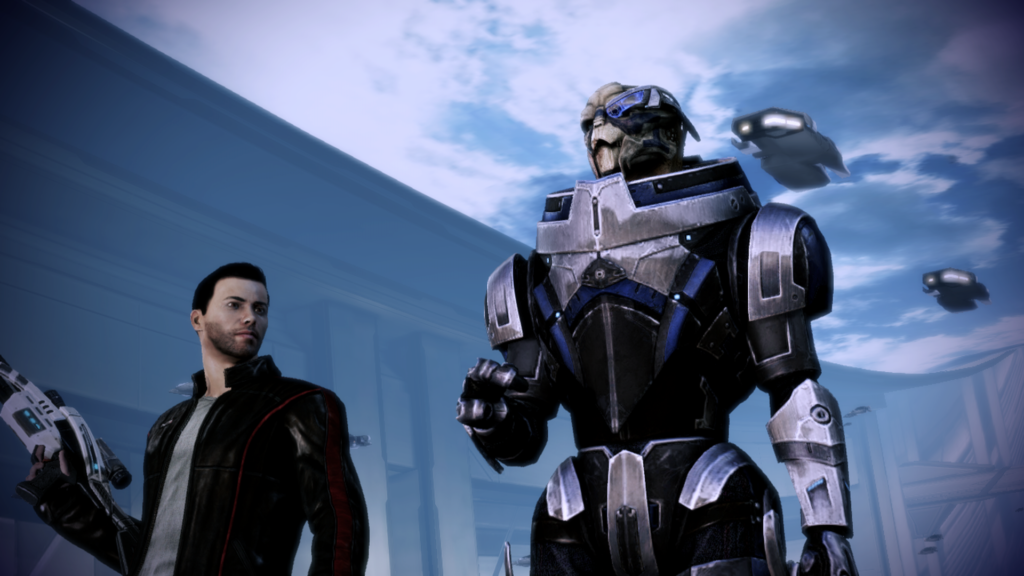
That scene has so much funneled into it: three games of Garrus as a companion specializing in a sniper rifle, his face blown off from his days as the “Archangel” in Mass Effect 2, his rebellious outlook built on your dialog options over the whole series…His constant presence and quips as your experience an epic adventure.
And it wouldn’t have been nearly as meaningful if everything in Mass Effect didn’t have such a complete, vibrant universe.
That’s just Garrus — one in a cast of dozens. Through everything the game offers you — writing, gameplay, setting, music — characters and moments and plot threads are given ever greater depth and impact.
I’ve gone this far, and I realize I’ve barely even described the thing I’m talking about. Mass Effect is a third-person shooter action RPG trilogy. You take the role of Commander Shepard in an era when humans have recently discovered lightspeed travel and encountered intelligent alien species.
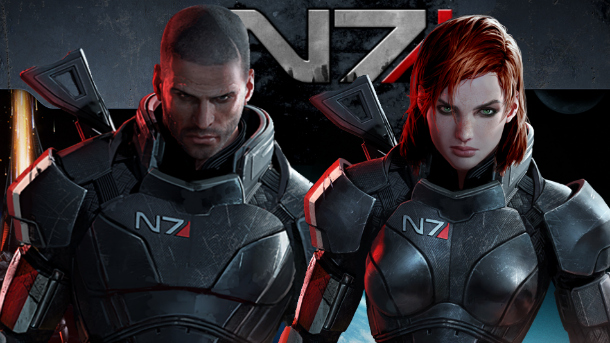
Over the course of the trilogy, you uncover a plot to exterminate life in the galaxy via an ancient species called Reapers. You assemble a crew and unite the galaxy in a struggle for survival.
The series pulls from dozens of inspirations, both in gameplay style and story. The first adventure uses meticulous worldbuilding and clunky stats-driven mechanics as Bioware toed the line between cheesy and immersive. The second and third outings are progressively more cinematic and action-focused. (This is one reason a lot of hardcore gamers cite the first game as the best, since it feels most tabletop RPG-ish.)
Frankly, I won’t begrudge any choice as the best of the trilogy. They all have their strengths: The original is the most thoughtful in laying out details for a plausible and fascinating galactic civilization; it offers the most open-ended approach to crafting your own character. The second outing offers the most character development, and provides tiny, powerful moments of drama (my God, the emotional catharsis of the Jack romance scene). And the third serves as a climax for everything before it, with hyper-slick action and world-class production values. Take your pick. I’ll take it, too, because I love all three.
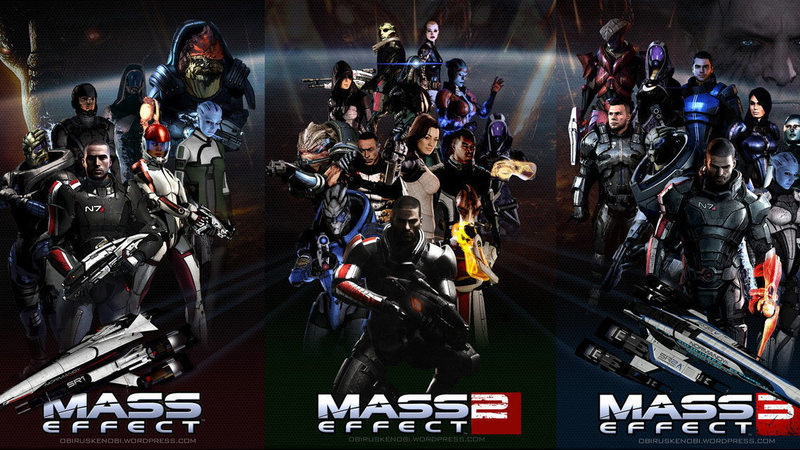
Yet while I love all three, there’s no question of my favorite: number two. It’s not only my favorite ME game, it’s my favorite video game, period. The sophomore outing eschews complex narrative (nasty aliens do nasty shit; let’s smoke out their HQ) in favor of building a band of outcast characters, to the game’s benefit. The ending, colloquially the “suicide mission,” is quite possibly the greatest final act in video game history; a pure adrenaline rush. Every decision and action matters. There are real stakes: well-developed characters can die in an instant, out of the game for the rest of the series in your save file.
Part one is probably my least favorite, due to its heavy emphasis on world detail ahead of great characters (though this investment in a fleshed out universe certainly opened up the later games). The gameplay feels more unwieldy, and the graphics are ass-ugly in comparison with what would come. Though the quest is epic and self-serious, its tone is thrown askew by bits of hamminess, like the revelation that the big bad is actually an evil sentient spaceship, and its pace is hampered by a slow start and a huge exposition dump in the third act.
The third game gets a bad rap thanks to the ending — more on that in a moment — but it’s, in many ways, the strongest in the series. The focus on payoff and constant climax make it a riveting visceral experience, even if it sabotages its sense of open-ended choice. (Like, who is actually evil enough to stop Mordin from saving the Krogan? Draco Malfoy?) The graphics are beautiful, and the storytelling is rich and whiplash-quick.
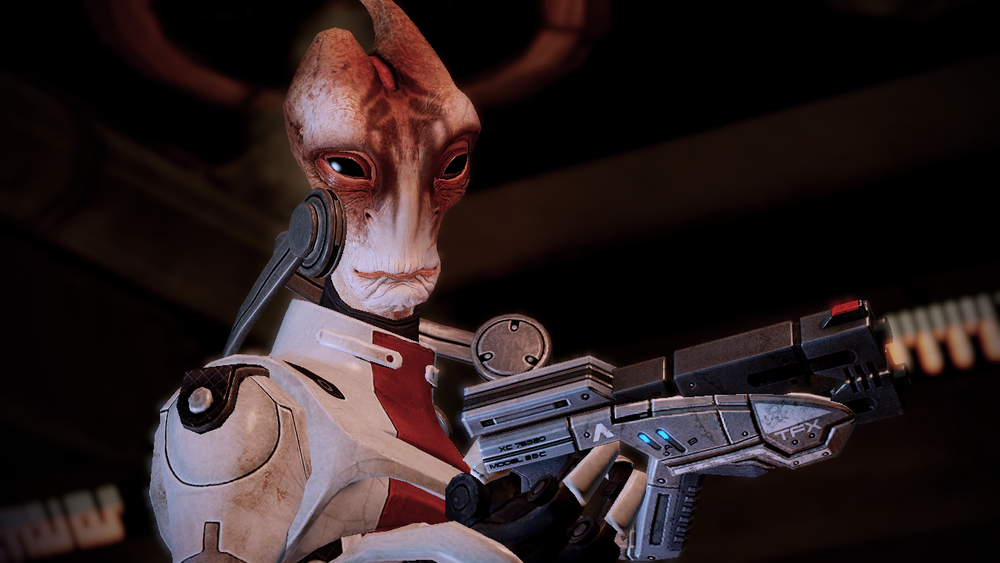
Perhaps the series’ biggest innovation is that you carry over your decisions from one game to the next by importing old save files. It expands your sense of agency in the game world and drastically improves replayability (or at least the illusion thereof): The promise of a branching, open-ended story is enticing. Unfortunately, the series ends up railroading you on some choices and consequences so that it feels like your choices didn’t have as much impact as they could have.
(Before it came out, I always dreamed about the third game as something that could be a completely different experience, from start to finish, depending on the decisions you made in earlier games; but it simply wouldn’t be practical for a game with this level of production values.)
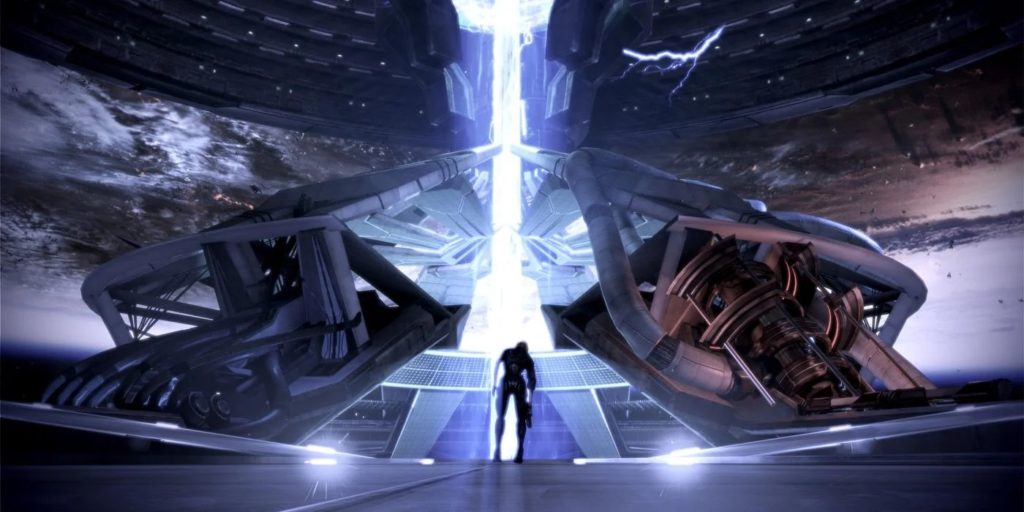
From the series’ start, BioWare promised a reactive, divergent conclusion that made sure your previous choices mattered…
And then they delivered the polar opposite of that in the closing minutes of ME3. What a disappointment. What a colossal failure and waste of a great story. No epic showdown. No closure. No payoff on uniting the galaxy. No twists or turns.
A half-decade’s worth of choices were discarded for a pseudo-metaphysical fart that essentially asked you to choose one of three color-coded outcomes. It reduced a sprawling saga into a Philosophy 101 punchline about the future of AI, and not even a good punchline. The ending was so bad that people took seriously the idea the badness was intentional, that what we experienced was “all a dream” and a marketing ploy for some future DLC that contained the REAL ending. If only.
BioWare attempted to make amends by releasing a free “Extended Cut” update to the conclusion. It helped a little, providing a few more character moments and bits of context. It’s still a huge letdown, especially in comparison to how the developers had crushed the conclusions of Dragon Age: Origins and ME2.
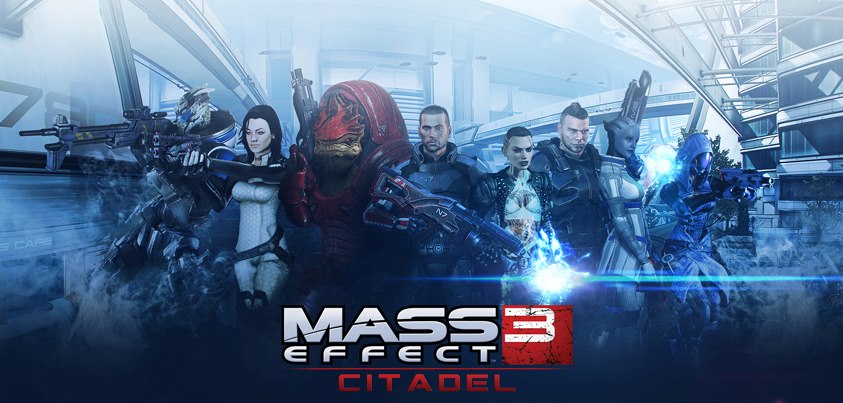
After the furor died down, and a handful of middling patches and DLC, BioWare released a final, special piece of DLC called “Citadel.” It’s technically not a new ending; it takes place before your final mission (though there is an afterlife fan theory).
But “Citadel” is effectively a true alternate ending. It goes the exact opposite direction of the official conclusion, stuffing fan service, character interactions, and silly sci-fi fun into a few hours. The goofy quest, featuring dark matter and clones and lots of stuff that had previously been rumored to be a part of the real ending, is bonkers in a good way. And the DLC episode concludes with an extended dance party that lets you reminisce with all the old characters. Repeated: The last DLC of the last Mass Effect game ended with a dance party.
I say without exaggeration that “Citadel” is the probably greatest, most satisfying piece of DLC in video game history. It’s exactly what fans wanted after the exhausting, disappointing, pretentious end to Mass Effect 3.
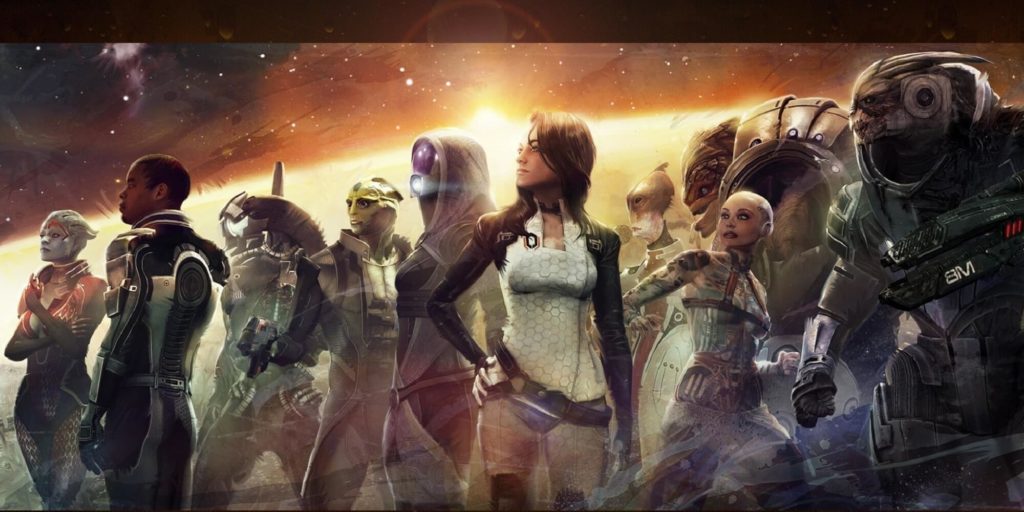
Not a week goes by that I don’t fondly wish to replay the entire trilogy. It’s not only my favorite game series, it’s one of my favorite pieces of fiction, period. It’s stuffed to the brim with heart and drama and twists and comedy and romance. It’s just so good. And yet, the scope of its experience is ultimately what prevents me from revisiting it. As a new dad, I’m limited; my capacity for 50-hour sagas is virtually nonexistent. Maybe one of these years, I’ll carve out some time. If I do, I’ll check back in here.
In the meantime… I’m Commander Shepard, and this is my favorite game series of all time.
Some other thoughts:
- The game lets you play “paragon” or “renegade” styles — loosely “good” or “bad(ass).” Unfortunately, there’s not a real “middle ground” route to encourage real roleplaying or balancing moral styles. The most interesting content and outcomes are deep down either the “paragon” or “renegade” paths. I want to make a special shout out to the writing of “renegade” Shepard, which offers some of funniest moments of the series.
- My top five characters, in some order: Garrus, Tali, Mordin, Liara, Wrex. Shoutout to Legion’s and Jack’s loyalty quests in ME2 for outstanding individual episodes.
- I have a laundry list of complaints about decisions or threads that disappointed or disappeared: handing Reaper technology over to Cerberus, original identity of the Shadow Broker, choosing the makeup of the Council after defeating Sovereign. Two threads that did end up very satisfying: Quarians vs. the Geth, and the Krogan Genophage.
- Mass Effect 3 introduced an online multiplayer mode. Presumably they wanted a way to continuously monetize the game like the big-budget shooters of the time. I didn’t bother, though. It seemed like a timesuck and break from the open-ended, story-based single player saga.
- Kudos to the opening mission of Mass Effect 2 for its audacity. On the heels of your victory at the end of ME1, you find yourself in control of the crippled Joker as your ship, the Normandy, is blown up by mysterious aliens, leaving Command Shepard for dead.
- In 2017, BioWare released the much-hyped first game in a new series called Mass Effect: Andromeda. On the surface it should be a home run: The premise is cool (help start a colony in a mysterious new galaxy), and BioWare had just returned to critical acclaim with Dragon Age: Inquisition. The reality was a game that didn’t inspire enough urgency for me to even finish. Like Inquisition, it suffers from a bit of “more-is-more”-ism with its map exploration and grindy quests, and the characters failed to capture the Mass Effect spark.





I find this review so interesting because you and I are the same age and have both played a lot of video games, but my formative years for gaming were in the mid-90’s, and I essentially stopped consuming new games when I graduated high school. I can count on one hand the number of PC games I’ve played meaningfully, and the only console I’ve owned more advanced than a PS2 is the PS3 I bought used last year so I could play Red Dead Redemption with my siblings across the country.
So I was brought up on JRPGs, and while this is a different animal, the emphasis on characters and narrative makes this game very interesting to me based on your review. (Prior to reading this, I was familiar with Mass Effect by name only.) I have a very small and specific time slot carved out for continuing to play video games these days, and I’ll strongly consider working Mass Effect into that slot. Although, I historically suck at FPSs, so if this is going to place any high demands on my dexterity, it’ll be a big problem.
One question remains for me: is this your favorite video game ever by a wide margin? Like, how close is the call between this and Smash Bros., or are there other contenders in between?
I didn’t really play many RPG’s until middle school when I played just a couple. College was actually my prime gaming time, hence a love for Mass Effect. I do recommend it, but it’s a tougher sell for a dad with limited time, as it takes awhile to get going in game 1. It is of course very good once it does get going though.
It is an action-focused game; you can always pause and recalibrate, but it has some “shooter” DNA in it for sure. I actually recommend playing Easy mode for that reason; it’s what I’ll probably do if/when I replay it.
Very good question about the spacing in my ranks of favorite games ever. Mass Effect used to be head and shoulders above the rest, hence its placement here (I kept my ranking from 2014), but now it’s more of a “top tier” with a lot of games I’ve loved quite a bit through the years. ME2 is still probably #1 but I haven’t replayed it since well before my 3-year-old was born.